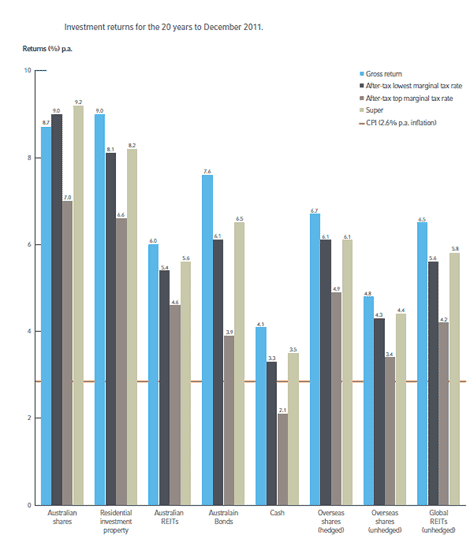Residential property investment outperformed all other asset classes for past 10 years: Russell Investments

Investing in property over the last two decades has delivered strong compared with shares and other asset classes, according to the latest Long Term Investing report from fund manager Russell Investments. The fund manager says taxation policies have been a key factor in the sector’s long-running attractiveness.
Over the past 10 years to December 2011 residential investment property has outperformed all other asset classes at the lowest and highest tax rate at 7.2% p.a. and 5.8% p.a. respectively.
Over the 20-year period, Australian shares returned 9% p.a. and 7% p.a. at both the lowest and highest marginal tax rates respectively, with residential investment property achieving the second highest return of 8.1% p.a. and 6.6% p.a. at the lowest and highest marginal tax rates respectively.
Click to enlargeCash had the lowest returns under both tax regimes of all asset classes over 20 years.
Calculations by Russell Investments over the 20-year period show that the effective tax rate for top marginal tax payers is most favourable for Australian shares at 20%, with residential investment property at 26% and Australian REITs and 23%.
In comparison, the effective tax rate for overseas shares is 28%, it rises to 36% for global REITS and is at 49% for cash and bonds.
“The impact of personal taxation on residential investment property has also been less significant as a result of the tax deductibility of expenses relating to residential investment property,” says the Russell Investments report.
“All three asset classes (Australian shares, residential investment property and Australian REITS) also provide tax deferral benefits and qualify individual and superannuation investors for a capital gains tax discount on liquidation, which contributes to their after-tax attractiveness relative to bonds and cash,” the report continues.
Earlier this week, Prime Minister Julia Gillard ruled out removing generous tax break offered to property investors who negatively gear their investments over concerns it would “distort the market”.
Russell Investments does caution investors that residential property is no longer a risk free asset class or a sure bet for future growth.
“The investment fundamentals of residential property are becoming less attractive compared to listed shares,” says Greg Liddell, Russell’s director of consulting and advisory services.
“The main risks for residential property relate to relatively high valuations and the prospect of further deleveraging by Australian households.
“Low rental yields will make it difficult for residential property to outperform listed shares as an investment over the next decade,” he says.
At the Prime Minister’s Economic Forum in Brisbane yesterday, Westpac boss Gail Kelly said compound growth in house prices were over for good and Australia would not see another housing boom.
Share board image courtesy of Flickr.
